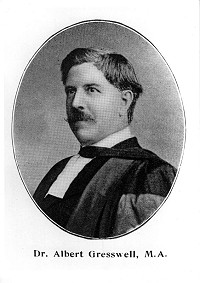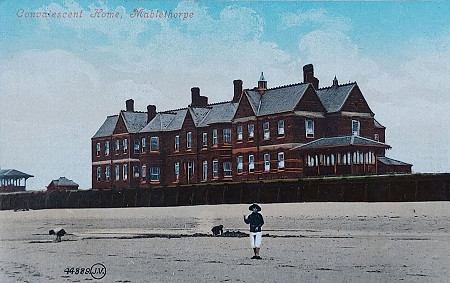Hints on sea bathing

Dr Albert Gresswell

Mablethorpe Convalescent Home
The 1890 edition of “Ruscoe’s Guide to Lincs, Mablethorpe and Sutton on Sea” opens with an essay titled “Hints on Sea-Bathing in the German Ocean” by Albert Gresswell, MD, of Kelsey House, Mercer Row, Louth. Albert Gresswell (1856-1927) was a doctor at Louth Hospital on Crowtree Lane. He attended Louth Grammar School, studied at Oxford, Bonn and Leipzig, travelled widely, and authored numerous works on medicine, veterinary science, and evolution.
Gresswell’s “Hints on Sea-Bathing in the German Ocean” focused on the benefits and dangers of partially submersing yourself in the North Sea. For the late Victorians, sea-bathing was perceived as a cardiac and neurological tonic to the body and mind. The cold and salty water, the blows of the waves and the sea air all contributed to this idea. Sea-bathing did not involve swimming, and was a segregated activity. Mixed bathing only became common in the early twentieth century. Once a van or bath hut had been pulled by a horse or a man into the sea, the bather was to emerge and carefully walk until they were at the most waist deep in the sea. Gresswell cautioned that five minutes was the maximum time anyone should spend in the water, otherwise they could catch a cold or become depressed from cooling nerves.
Gresswell particularly counselled overweight men to indulge in sea-bathing: “The stimulus of the cold water on the surface of the skin ... produces ... an augmentation of the conversion of fat, and hence lean persons cannot withstand the effects of cold water ... so well as well-nourished persons who are rich in blood can.” He added that the thin should try bathing in the indoor heated sea-water bath at the Mablethorpe Convalescent Home. It had opened in 1871 and was the only home in the country to provide hot sea water baths free to its patients who came to experience the bracing sea air and recover from tuberculosis, rheumatism and physical and mental overwork. Gresswell ended his hints with a rousing invitation to experience the life-giving qualities of visiting Mablethorpe: “We as inhabitants of Louth, should never fail to realise that for one shilling, we can travel on the railway to a strand which is unsurpassed in the whole world, and within about 40 minutes from starting can forget all our troubles ...”